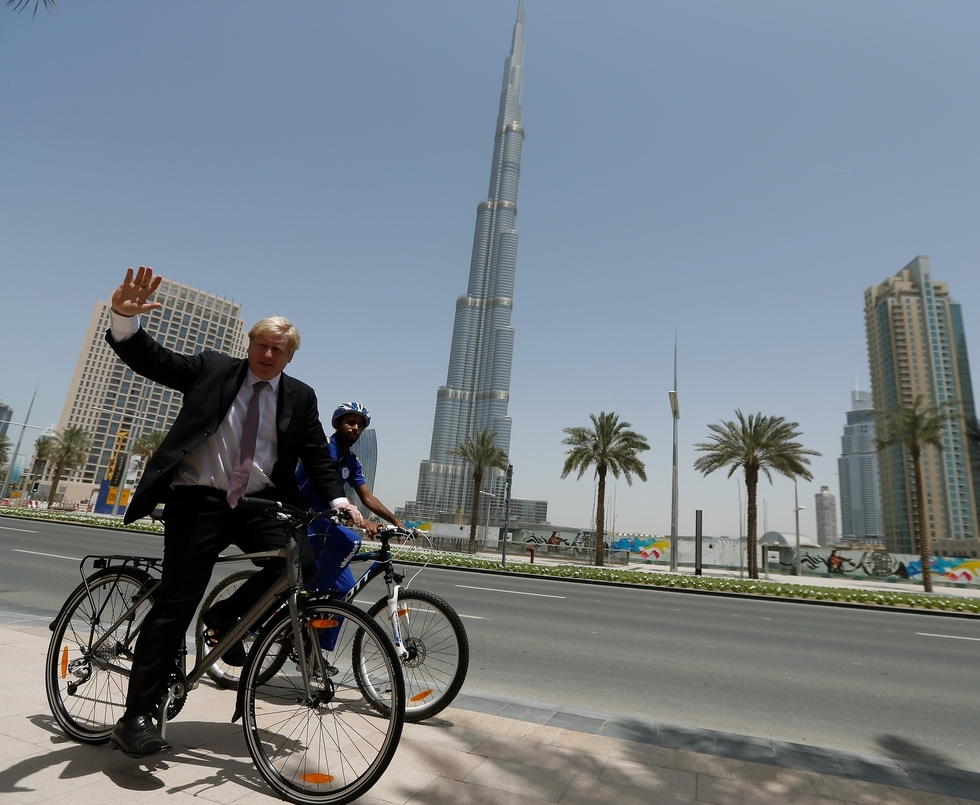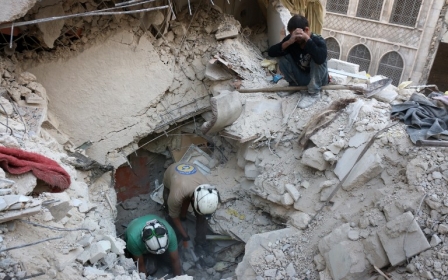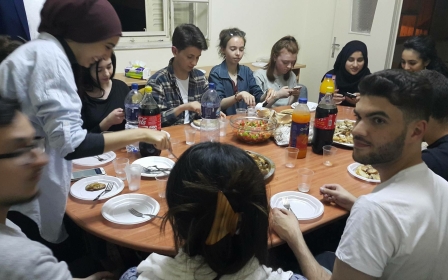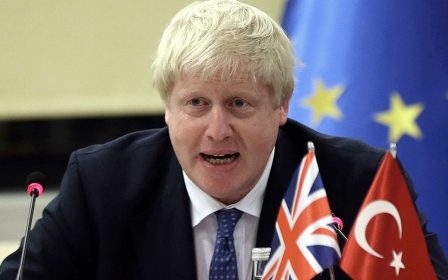Rolls Royce, pants and sand: What Boris Johnson said to the Arab ambassadors

Away from the endless discussions on Brexit at this year’s Conservative party conference in Birmingham, there were the usual fringe meetings and receptions that complement such an occasion.
It is clear where Britain’s and his current priorities lie: the impact of Brexit clearly comes ahead of solving the problems of the Middle East
One such event was the Arab ambassadors' regular reception to which the Foreign Office normally invite the foreign secretary. I was grateful for an invitation. On previous occasions, the person who ended up attending to speak on behalf of the party and government was a junior minister rather than their boss.
However, on this occasion the rumour was that it would be the man himself, Foreign Secretary Boris Johnson. There was notable excitement among the attendees, including ambassadors representing countries from across the world.
We knew that the main speaker was about to arrive when the Kuwait TV camera and the ambassadors were summoned to the entrance led by his excellency, the doyen of the London diplomatic corps, Khaled al-Duwaisan, Ambassador of Kuwait.
It took some 10 minutes for Boris to complete the round of handshakes and small talk before he could be welcomed formally.
Balfour's legacy
The doyen welcomed Boris as a "star" of Britain and praised him not only as current secretary of state but also for his previous role as mayor of London. He told him that “our relations as Arab countries are very strong’ and Britain has with them a “historic relation”.
'Sir, we don’t need the money, we need you to be more involved in the political process'
He then invited the head of the diplomatic mission of Palestine, Professor Manuel Hassassian, to address the foreign secretary. It was not clear whether this had been agreed in advance, but the foreign secretary was happy for this to happen.
Professor Hassassian made good use of this opportunity to remind Boris of why 2017 would be a "remarkable year" for Palestinians. “We will be commemorating the hundred years of the Balfour declaration and 70 years of the Nakba and 50 years of the occupation and 10 years of the Gaza siege,” he explained.
He thanked the UK for the "nice words" of support and the money it donates to support the Palestinian Authority. This brought a smile to Boris’s face. Then the ambassador hit hard: “But Sir, we don’t need the money, we need you to be more involved in the political process.”
Hassassian suggested that "crisis management" had been a dismal failure and that what is needed is "conflict resolution". He did not think it was enough for Britain to consider not importing goods from Israeli settlements or to simply say that it is for the two-state solution or the right of the Palestinians to self-determination. “Those are nice words to be said, but we need to see them concretised on the ground," he challenged.
He also reminded the foreign secretary of Britain’s role. The Balfour Declaration, he said, “was the starting point in the destruction of Palestine. Great Britain should shoulder its historic, legal and moral responsibility." He laid a challenge at Boris’s door to “add one sentence to the Declaration: 'the recognition of the independence of Palestine'".
Rolls Royces, pants - and sand?
Anyone thinking that Boris would rise to the challenge was quickly disappointed.
“I hope you will forgive me if I don’t venture to solve the problems of the Middle East peace process tonight off the cuff,” he told the crowd. In his typical light-hearted style, Boris acknowledged the doyen's important role in leading the ambassadors in “paying the London congestion charge”.
Returning to more important matters, Boris acknowledged the importance of solving the Palestinian problem, but that “it was not the only problem in the region”. He seemed surprised at the lack of reaction to his statement. He then significantly stated that he did not believe that that region should be “defined by those problems”.READ MORE: Human rights advocates weigh in on Boris Johnson's comments and the UK export push to the Middle East
"It is absolutely vital that we do not allow the Middle East, the Arab world in the eyes of the British public to be defined by these problems," he said, arguing that the region should be seen as providing a great opportunity, particularly following Brexit.
He stunned the audience when he proclaimed that 'the growth in exports to the Arab world outstrips any other part of the planet including the EU'
Reflecting on his time as mayor of London, Boris Johnson said that people used to accuse him of being the mayor of the “eighth Emirate”. He acknowledged the massive investment London has received, which changed its skyline. He described the Shard as “poking through like a gigantic cocktail stick through a super colossal pickled onion”.
Boris then talked of the opportunities in the other direction as “we also get the ball back over the net. This is the fastest-growing economic partnership that Britain has”. He then stunned the audience when he proclaimed that “the growth in exports to the Arab world outstrips any other part of the planet including the EU”. The exports include Rolls Royce cars, pants and “sand to Saudi Arabia”.
He finished with an acknowledgment of cultural synergy between Britain and the Arab world as the 400th anniversary of its greatest author is celebrated “who was himself a Sheikh," he said with a dramatic pause. "Shakespeare!" This brought the house down.
Seize the opportunity
This was Boris Johnson at his best, connecting with the audience brilliantly and they loved him.
However, it is clear where Britain’s and his current priorities lie. The impact of Brexit, which was being debated in the serious sessions taking part in Birmingham’s magnificent Symphony Hall, clearly comes ahead of solving the problems of the Middle East.
My only regret was that, had I known Boris was to speak at the reception, I might have turned up in a corduroy jacket
The foreign secretary directed approaches to him on these issues to his junior minister, Tobias Ellwood, who was also in attendance. I doubt if he would have done that with such ease to the Israeli ambassador.
The most important message I took away from the evening was the statement about the growth of exports to the Middle East far exceeding any other part of the planet. I would see this as an open opportunity for the Arab world to influence British foreign policy in its favour as Britain seeks to develop its economic ties with markets outside the EU.
I would urge the Arab ambassadors who attended the reception to see this significant opportunity and formulate policy accordingly. This would be power not only for the various troubled countries in the region but also for the Palestinian problem. Their collective voice could and should be used to influence the kind of approach Britain takes to 2017 and, in particular, the centenary of the Balfour Declaration.
My only regret was that, had I known Boris was to speak at the reception, I might have turned up in a corduroy jacket but I do not own one. During a visit to Israel last year, the then London mayor accused supporters of the Boycott, Divestment and Sanctions (BDS) movement of being “completely crazy” and being promoted by a “few lefty academics” in corduroy jackets pursuing a cause.
I did manage to shake Boris’s hand at the reception wearing a suit and he may remember me as not “completely crazy”. He needs to realise that those working for justice for Palestinians are neither crazy, nor anti-Semitic, as Israel and some of its supporters claim.
- Kamel Hawwash is a British-Palestinian engineering professor based at the University of Birmingham and a longstanding campaigner for justice, especially for the Palestinian people. He is vice chair of the Palestine Solidarity Campaign (PSC) and appears regularly in the media as commentator on Middle East issues. He runs a blog at www.kamelhawwash.com. He writes here in a personal capacity.
The views expressed in this article belong to the author and do not necessarily reflect the editorial policy of Middle East Eye.
Photo: London mayor Boris Johnson salutes photographers as rides a bicycle in front of Burj Khalifa, the world's tallest tower, during his visit to Dubai, on 16 April 2013 (AFP)
Middle East Eye propose une couverture et une analyse indépendantes et incomparables du Moyen-Orient, de l’Afrique du Nord et d’autres régions du monde. Pour en savoir plus sur la reprise de ce contenu et les frais qui s’appliquent, veuillez remplir ce formulaire [en anglais]. Pour en savoir plus sur MEE, cliquez ici [en anglais].





